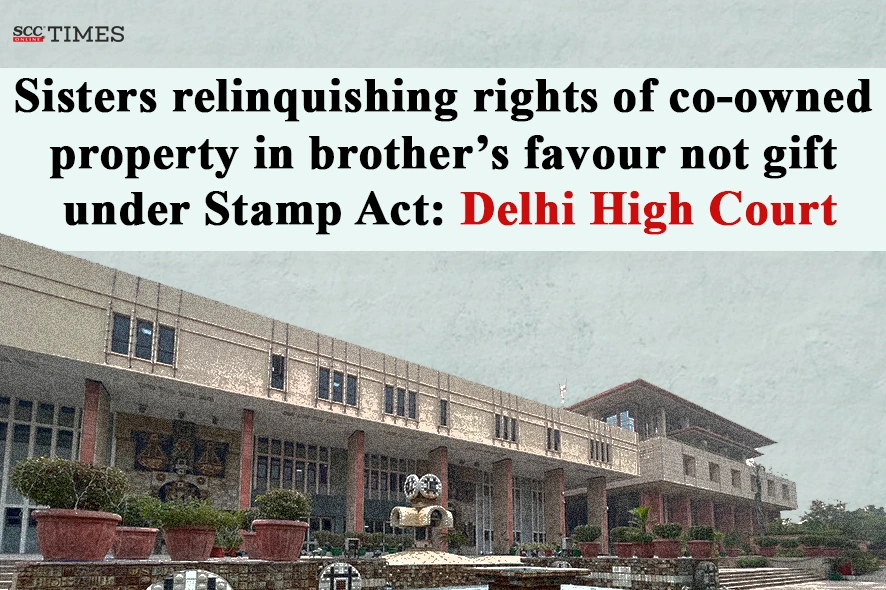Delhi High Court: An appeal was filed by the appellant challenging the order passed by the Single Judge upholding the impounding of the Relinquishment Deeds (‘RDs’), executed in his favour by his five sisters, on account of deficient stamp duty by treating them as gift deeds. The Division Bench of Anil Kshetarpal* and Harish Vaidyanathan Shankar, JJ., held that the relinquishment of rights on a property by the sisters, who were co-owners, in favour of their brother, another co-owner, could not be said to be a gift for the purposes of the Stamp Act, 1899 (‘Stamp Act’).
The Court stated that the procedure contemplated by the Stamp Act facilitated the collection of revenue for the State and the nomenclature of a document was not decisive for the purpose of adjudicating the liability to pay stamps. Thus, the Court allowed the appeal and held that the relinquishment of rights by the sisters was in the nature of a Family Settlement.
Background
In the present case, the dispute arose from the property jointly owned by the father and mother of the appellant. After their demise, the property was jointly owned by the appellant and his five sisters as Class-I legal heirs. All his sisters, three on one date and two on another, executed separate RDs in favour of their brother, in the lifetime of their mother, and presented the same for registration.
When the Sub-Registrar addressed the Collector of Stamps regarding it, the appellant received information that the RDs have been impounded on the ground of being deficiently stamped. Subsequently, the Sub-District Magistrate (‘SDM’) after perusing the written explanation of the appellant concluded that the said five RDs were chargeable for stamp duty under Article 23 of Schedule I of the Stamp Act. Thus, in accordance with the Valuation Report submitted by the Tehsildar, the SDM imposed the stamp duty of Rs 6,60,257 along with a penalty of Rs 1,00,000. Consequently, to avoid the immediate attachment of property, the appellant deposited the aforesaid amount under protest via challan.
An RTI application was filed before the SDM seeking details of RDs impounded on the ground that it was tantamount to a gift and was not sufficiently stamped. However, an unsatisfactory response was received, and consequently, an RTI Appeal was filed, but the Sub-Registrar failed to provide the information.
Challenging the correctness of the orders passed by the SDM and unsatisfactory response to various RTI applications, the appellant filed a case before this Court which was dismissed by the Single Judge. Aggrieved by the same, the appellant approached this Court.
Issue, Analysis and Decision
After pursuing the facts of the case at hand, the Court stated that the issue that arose was “whether for the purpose of the Stamp Act, the relinquishment of rights in a property by the sisters in favour of their brother could be treated as gifts or not?”.
The Court held that relinquishment was not tantamount to alienation of rights, and an RD between the co-owners held equal force as an RD between the coparceners. Further, the Court observed that the release deed could only feed title but could not transfer title and in the present case, the appellant, his mother, and his five sisters all became co-sharers in the suit property on the death of the appellant’s father. The transaction was between the family members, wherein the chances of economic consideration were remote. Hence, the RDs had only added a title to the already existing title of the appellant. The Court, therefore, held that an error was committed in the Impugned Order by treating the RDs as deeds of gift for the purposes of the Stamp Act and upholding its impounding.
Further, the Court held that the relinquishment of rights on a property by the sisters, who were co-owners, in favour of their brother, another co-owner, could not be said to be a gift for the purposes of the Stamp Act. The Court emphasized that the procedure contemplated by the Stamp Act facilitated the collection of revenue for the State and the nomenclature of a document was not decisive for the purpose of adjudicating the liability to pay stamps.
The Court specified that the sisters had executed the RDs to release their share in favour of their brother, and there was no economic consideration exchanged at the time of the execution and by the Will executed by their father, he had already became owner to the extent of 50 per cent share. Thus, all the RDs were basically acknowledging the bequest that was made by the father in favour of his son and the RDs formed part of a single transaction and hence could not be a single determinative factor for the RDs to be considered as Gift Deeds.
The Court allowed the appeal, set aside the Single Judge’s order, and held that relinquishment of rights by all the sisters in favour of their brother was in the nature of a Family Settlement.
[Ramesh Sharma v. State (NCT of Delhi), 2025 SCC OnLine Del 6367, decided on 8-10-2025]
*Judgement authored by Justice Anil Kshetarpal
Advocates who appeared in this case:
For the Appellant: D.N. Goburdhun, Sr. Adv. with Archit Chauhan, Attin Shankar Rastogi, Shivkant Arora, Adil Vasudeva and Saloni, Advs.
For the Respondents: Abhinav Sharma, Adv.


